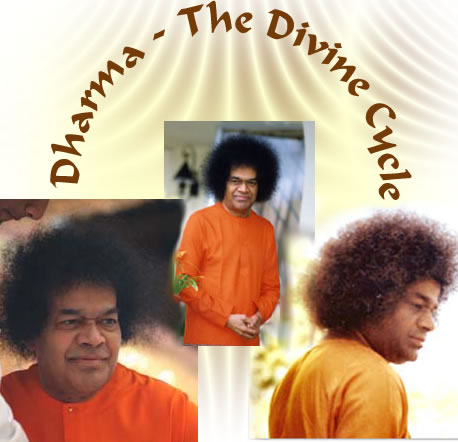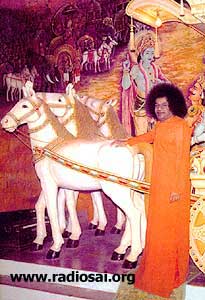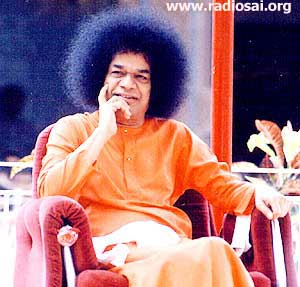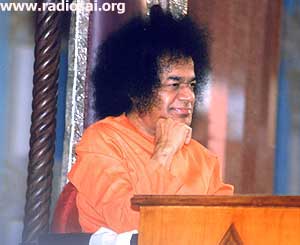|
“I alone know the agony of teaching you each step of the dance,” said Swami once. What a confession by the Dance Master of the Universe! And how amazingly appropriate! He has to maintain balance and order in the Cosmos when the “gravitational pull of a single electron randomly shifting position can affect even the outcome of a billiard game on earth!”Dharma – Duty with Reasoning Action is at the very heart of the Universe. The Universe itself came into existence because of action and it cannot be sustained without this action chain. But what is Right Action? There is no word that can convey the depth, amplitude and vibrancy contained in the word ‘Dharma’. Swami explains the concept of Right Action from the root words of Dharma “dharini and dhru”- as the vesture that binds the whole world. He explains the concept of Dharma, shorn of all that is esoteric and erudite, through a simple fable. When Dasaratha was running after Rama’s chariot, which bore him to the forest, he was crying out in anguish - “Stop, Stop! I command you to stop.” The charioteer Sumantra did not know what to do. Rama told him: “Don’t stop. If Dasaratha chides you later, tell him that you did not hear.” Sumantra was in a fix. How could he tell a lie? Rama explained to him: “The order to stop the chariot came from Dasaratha, the grief-stricken father. The order to take me to the forest had come from Dasaratha, the king. You have no Dharma to listen to the ravings of a man grieving for his son. But you have an absolute obligation to listen to the command of your king.” Sumantra therefore had an obligation to use reason in determining his Paradharma . Swami explains: “The word Dharma does not even mean duty. In duty there is no freedom. In reason there is freedom. Dharma is an obligation that imposes both duty and reason.” For Swami, Dharma is not mere adherence to rules, but an extension of his oft-repeated concept of unity of thought, word and deed – Trikarana suddhi. He says, “It is good to be born in a church, but it is not good to die in it. Grow and rescue yourself from limits and regulations, the doctrines that prevent your freedom of thought, the ceremonial rules that restrict. Reach the stage where churches do not matter, where all roads end, from where all roads begin.”
The Bhagavad Gita is a gospel whose message is timeless. In words that belong to Eternity, Incarnate God speaks to man; His friend. In Gita Vahini, the Eternal Charioteer speaks again on Dharma. Sai Himself interprets in Kaliyuga, what He uttered in Dwaparayuga. For has Swami Himself not declared, “I am Vasudeva!” Swami makes two profound modifications to generally accepted interpretations of Gita. Firstly, He says that when Krishna was speaking about Swadharma (individual duty), He was basically referring to Atmadharma (duty of the self). “Again looking at your own duty as well (Swadharma), you should not waver; for there is nothing more welcome to a Kshatriya (member of a warrior clan) than a righteous war.” (Gita 2.31) Right Action and Right Conduct in Individual Dharma Every creature is bound by its own respective individual Dharma. And what is right action for one may not be right action for another. The story of King Sibi brings out this point dramatically: A pigeon chased by an eagle seeks refuge with King Sibi, an ancestor of Rama. When warned not to harm the pigeon, the eagle says, “The pigeon is my prey. To hunt and kill it is my Dharma. It may be your Dharma to protect those who seek refuge in you. But in that process why are you interfering with my Dharma?” And the story goes that Sibi offered an equivalent weight of the flesh of his own body to adjudicate the matter. Bhagavan’s Prescription for Moral Dilemmas Swami points out that while following Paradharma, one should not violate Atmadharma, nor do anything which is against the nature of Atma. And He gives simple prescriptions for the daily conduct of Dharma.
“What is Dharma? Let me summarize it. First, treat your parents with love, reverence and fortitude. Second, act as you speak, speak as you feel and do not play false to your conscience. Third, be calm and levelheaded and maintain equipoise. And finally listen to the voice within!” In another significant departure, Swami refutes the point that working for reward is immoral. But Swami offers an improved recipe: “Perform action as an offering to God without hankering for reward and without any sense of individual doership.” This was another reaffirmation of Krishna, who said: “Therefore surrendering action to Me, thy thoughts concentrated on Me, the Absolute and the Self of all, freed from selfishness and without anticipation of any reward, with your mind in a perfectly calm mood, begin thou to fight.” (Gita 3.30) And how far is this Yoga of action practicable? And what happens when there is a moral dilemma. Sai Krishna provides the answer: “ Fix your mind on Me. Be devoted to Me. Sacrifice to Me. Prostrate before Me. So shall you come to Me. This is My pledge to you, for you are dear to Me.” (Gita 18.65) Transform Work into Worship When we see Divinity installed everywhere, as the indweller in every being, Karmayoga becomes Bhaktiyoga, work becomes worship. Swami says that the emphasis of such an offering should be Love. As the Sufi poet Khalil Gibran said: “Work is Love made visible. And if you cannot work with Love, but only with distaste, it is better that you should leave your work and sit at the gate of the temple, and take alms from those who work with joy. For if you bake bread with indifference, you make bitter bread that feeds but half man’s hunger. And if you grudge the crushing of grapes, your grudge distills a poison in the wine. And if you sing though as angels and love not your singing, you muffle man’s ears to the voice of the day and the voices of the night.”
As part of this pavithrakarma, Swami brings in the concept of Service. “Hands that help are holier than lips that pray.” In fact, He echoes the words of the bard of Shanti Niketan (Sri Rabindranath Tagore), who wrote over six decades ago, in language of unsurpassed beauty: “Leave this chanting, singing
and rolling of beads, As an international corporate citizen, I have worked in several continents with varying culture and environment. Several times I have experienced moral dilemmas. But whenever doubts assailed me and anguish stole a march, whenever I had conflict on what should be the right action, I always recollected the story of Dasaratha and found immediate clarity. Several times I have also experienced moral dilemmas. But whenever I surrendered to Swami, all action and the fruits thereof; confusion, doubt and dismay vanished like the mist before the morning sun. Turning Action into Sacrifice, Surrender and Love Let me recount just one incident. This happened six years ago. As a group Chief Executive, I headed a cluster of operations in the United States belonging to our parent company, a Swiss conglomerate. One of these companies was going through extremely trying times. There was an economic recession. We sorely needed an infusion of capital, which was hard to come by. The company’s bankers were themselves in the middle of a restructuring process and had indicated that they would not extend the loan when it came for renewal in September that year. During a board meeting in August, the directors took stock of the situation. While appreciating all action taken by the company, they saw no other option except to suspend the operations. I asked for time, a four week period, in which to try out some alternative plans. I was concerned at the loss of employment and livelihood for the staff and workmen of the company, most of whom had put in long years of service and knew no other trade. There were several employees, each with his entire family working for the company - these would be devastated. The Board agreed to my request and decreed that if no acceptable alternative plans were found, the operations should be closed down on a Friday; four weeks hence. It was the longest four-week period of my life. I began each day with an intense prayer to Swami. I felt that it was my Dharma to ensure that I take any and all actions that would prevent a closure and loss of jobs. I met with several bankers and financiers to whom I made presentations about the Company’s financing needs. I approached competitors interested in consolidation and possible acquisition of our Company. It was work round the clock. I tried, as Tennyson said: “To lose myself in action lest I wither in despair”. Nothing seemed to succeed. There seemed to be no other option except to let the employees go. All too soon the penultimate Thursday, the day before the expiry of the time limit given by the board was on me. As a last resort, I decided to meet a competitor to try and work out a possible sale of the company. As the long day wore on, it seemed clear that even that would not work. The buyer would not agree to a vital condition that I insisted - not to shift the operations and jeopardize employment. As I drove back home totally dejected, I recollected the words of Shelley: “I was in the shadows of a
starless night in which I moved alone En-route I passed my workplace. I cast a long lingering look behind. It had started raining; and in the dim haze, I fancied that I saw the several families that would be jobless by the next day. As I retired that night I wondered what next after Result-less Action. And whatever happened to Krishna’s pledge in chapter18 “pratijane priyoasi mey ” (This is my pledge to you for you are dear to Me). With great effort I betook myself to work next morning to do the inevitable. As I reached the outskirts of the plant, I found the traffic blocked and a large group of people assembled. All around, as far as eyes could see, there was a sheet of water. Our factory was situated in a low-lying area. Due to the heavy rain the previous night, the river nearby had risen and inundated the area. There was four feet of water in and around our premises. The newspapers next day reported that this was a rare occurrence; the last reported flood in the area had occurred 80 years earlier and since then the river embankment had been strengthened. The actuarial calculations of the insurance companies had rated the probability of the region getting flooded as one in a million! The city and county geological officials were completely baffled!
It was another two days before water receded and we could get into the premises. We waddled in ankle deep water. When I entered my office, the photograph of Swami, which adorned my desk, stood calm and serene amidst the ravages of the deluge. It almost seemed to mock at me and repeat the words in chapter 18: “For those who prostrate before Me, solemn is My promise.” To cut a long story short, we did not have to suspend the operations the next day. The federal government declared the area a disaster area and FEMA (Federal Emergency Management) poured in funds for rehabilitation. We also benefited from a substantial insurance claim - for some strange illogical reason, which I still cannot fathom, I had earlier overruled my controller and instructed him to take a flood coverage, an unusual practice at that time and in that area. Further, we did not have to repay the term loan to our bank that September; as part of a public relations gesture the bank forgave the loan! Suddenly, we had the needed capital for implementing our plans. The livelihood of the families of the employees, my sole concern in the whole effort, was protected. Action, Sacrifice, Surrender and Love - How well this cycle works! Announcing His Divinity, Swami wrote to His brother in May 1947: “No one can comprehend My glory, wherever he is and whatever his method of enquiry and however long his attempt!” Generations to come will scarcely believe that such a one as this, in flesh and blood, ever walked on this earth. And it is indeed our privilege that we are contemporaries of this Avatar. The only tribute we can offer is to lay down our lives as flowers at His Lotus Feet! Jai Sai Ram!
|





